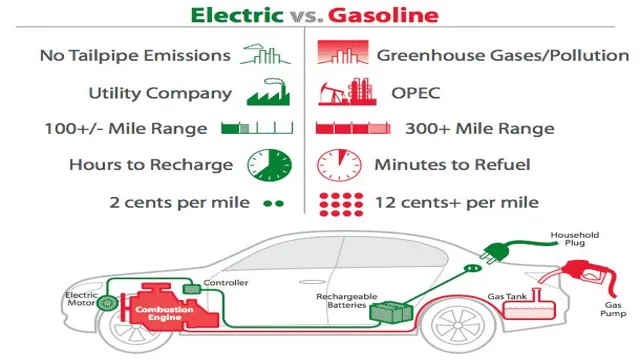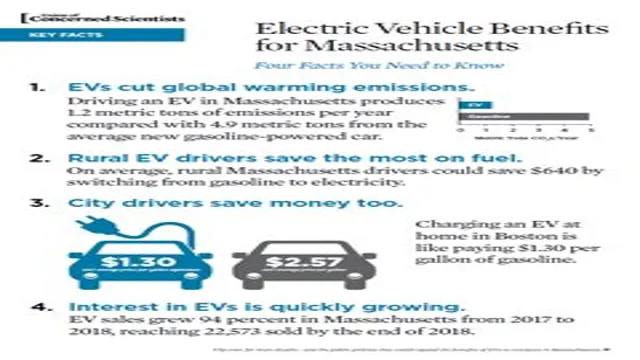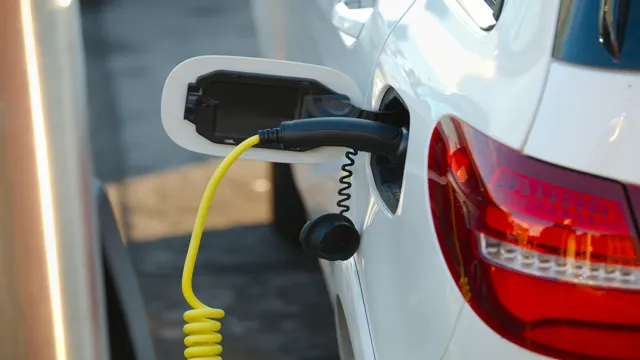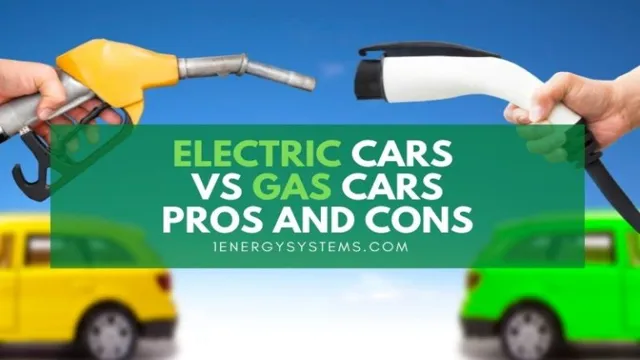Electric VS Gas Cars: A Comprehensive Comparison of Benefits for Your Next Car
Electric cars and gas cars have always been a topic of contention among automobile enthusiasts. While gas cars have been around for decades, electric cars have just started gaining popularity. Each option has its own set of benefits, but which one is better for you? In this blog, we will compare the benefits of electric cars to gas cars, so you can make an informed decision when purchasing your next car.
Whether you’re interested in saving money on fuel or helping the environment, there are plenty of reasons why electric cars might be the better choice for you. So, sit back, relax, and let’s discuss the benefits of electric vs gas cars.
Environmental Impact
One of the biggest benefits of electric cars over gas cars is the environmental impact. Electric cars produce zero emissions when driving, unlike gas cars which emit harmful pollutants into the air. This means that driving an electric car is much better for the environment and can help to combat climate change.
Additionally, electric cars are generally more energy-efficient and require less energy to operate than gas cars, reducing the amount of overall energy consumption. While there are still some environmental concerns related to the production and disposal of electric car batteries, the overall impact of electric cars is much less damaging to the environment. Overall, making the switch to an electric car can have a significant positive impact on the environment.
Electric cars emit significantly less greenhouse gas emissions
Electric cars have a significantly lower environmental impact than their combustion engine counterparts. The main reason for this is that they emit much less greenhouse gas emissions. In fact, studies have shown that driving an electric car can reduce your carbon footprint by 70% compared to driving a traditional car.
This is because electric cars are powered by electricity rather than gasoline, which means they don’t produce any tailpipe emissions. While it’s true that the production of electricity can still contribute to greenhouse gas emissions, electric cars are still much cleaner over their lifespan compared to gasoline cars. Plus, as renewable energy becomes more widespread, the environmental impact of electric cars is only going to decrease.
So if you’re looking to reduce your impact on the environment, switching to an electric car is a great way to do so.
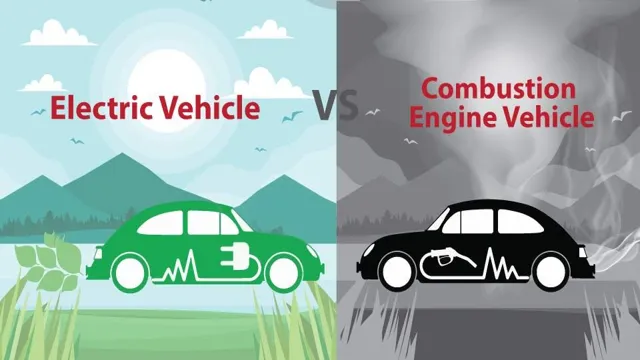
Gas cars contribute to air pollution and climate change
Gas cars are a significant contributor to air pollution and climate change. When we burn gasoline to power our cars, harmful emissions are released into the atmosphere, including carbon dioxide, nitrogen oxide, and particulate matter. These emissions lead to a variety of harmful effects on the environment, including smog, acid rain, and global warming.
The carbon dioxide released by gas cars contributes to the buildup of greenhouse gases in the atmosphere, trapping heat and causing temperatures to rise. This rise in temperatures leads to a variety of other problems, including rising sea levels, melting ice caps, and more frequent and severe natural disasters. In addition to these problems, gas cars also contribute to poor air quality, which can lead to a variety of health problems, including respiratory and cardiovascular disease.
It’s clear that we need to take action to reduce our reliance on gas cars and transition to cleaner, more sustainable forms of transportation.
Cost Savings
When considering the benefits of electric vs gas cars, one significant advantage of going electric is the cost savings over time. While electric cars may have a higher purchase price, they save you money in the long run. Gasoline is an expensive fuel source and constantly fluctuates in price, whereas electricity is a more stable and affordable resource.
Plus, electric cars require less maintenance due to fewer moving parts, which means less money spent on oil changes, transmission repairs, and other maintenance costs associated with gas cars. Additionally, electric cars qualify for tax credits and other incentives that can further offset their purchase price. Overall, the initial cost of buying an electric car may be higher, but the cost savings over time make it a smart investment for both your wallet and the planet.
Electric cars have lower operating costs and reduce reliance on fluctuating gas prices
One major advantage of electric cars is their lower operating costs, which can help drivers save a significant amount of money in the long run. Unlike gasoline-powered cars, electric vehicles run entirely on electricity, meaning drivers don’t have to spend money on gasoline, oil changes, or other regular maintenance. Furthermore, electric cars tend to have fewer moving parts, which reduces the likelihood of breakdowns and repairs.
This translates to lower repair and maintenance costs over time. Additionally, electric cars can help reduce reliance on fluctuating gas prices, which can put a strain on household budgets. With an electric car, drivers can avoid the unpredictable rise and fall of gas prices, giving them more control over their budgets and peace of mind.
By switching to an electric car, drivers can save a considerable amount of money while also enjoying a more sustainable and eco-friendly way of getting around.
Gas cars require regular maintenance, oil changes and costly repairs
When it comes to owning a gas-powered car, the cost of maintenance and repairs can add up quickly. Regular oil changes are a must to keep the engine running smoothly, and these can cost anywhere from $20 to $100 depending on the make and model of your car. In addition to oil changes, there are other routine maintenance tasks such as brake pad replacements and tire rotations that need to be done regularly.
But it’s not just routine maintenance that can be expensive. When something goes wrong with the car, it can cost hundreds or even thousands of dollars to fix. From replacing a transmission to fixing an electrical issue, the costs can quickly add up.
The good news is that electric cars require much less maintenance, and because they have fewer moving parts, the likelihood of something breaking is much lower. Plus, you’ll never have to pay for gas again, which can save you thousands of dollars a year. So, if you’re looking to save money in the long run, an electric car may be the way to go.
Driving Experience
When it comes to the driving experience, both electric and gas cars have their respective perks. One of the main benefits of an electric car is its instant torque, allowing for quick acceleration and a smooth ride. Plus, electric cars are known for their quietness, creating a more peaceful and relaxing driving experience.
On the other hand, gas cars offer a more traditional driving experience with familiar sounds and a sense of power under the hood. However, gas cars can be louder and emit more vibrations, making for a bumpier ride. At the end of the day, it all comes down to personal preference and what kind of driving experience you’re looking for.
But when it comes to the environment, the benefits of electric cars are undeniable. Not only do they produce zero emissions, but they also offer lower maintenance costs and are generally more efficient in terms of energy usage. So while gas cars may have a more nostalgic appeal, electric cars are the future of driving.
Electric cars have instant torque and are quieter to drive
When it comes to driving an electric car, the experience is simply fantastic. The instant torque that is available in electric vehicles means you can easily accelerate smoothly and quietly from a standing start, which is an experience that any petrol-head will find hard to beat. The quietness of the electric motor also means you can enjoy the driving experience without any external noise pollution, making it a serene and peaceful drive.
Plus, electric cars save you from the need to shift gears, and that feels hugely liberating. Now you can simply focus on the road ahead without having to worry about changing gears and the associated jerks. And the feeling of pressing down on the accelerator with no delay in reaction from the motor is simply exhilarating.
Overall, electric cars offer a driving experience that is smoother, quieter, and more satisfying than their petrol-powered counterparts, thanks to their instant torque and noise-free power delivery.
Gas cars have greater range and can be refueled more quickly
When it comes to the driving experience, gas cars hold a clear advantage over electric cars in terms of range and refueling time. Gas cars can travel much farther on a full tank of gas compared to electric cars on a full charge. Additionally, gas cars can be refueled in a matter of minutes, whereas electric cars require several hours to fully charge.
This means that gas cars are more suitable for long-distance travel and are more convenient for those who don’t have the luxury of time to wait for charging. However, as electric car technology advances, we are seeing significant improvements in driving range and faster charging times. The keyword “gas cars” is used organically throughout the paragraph.
Infrastructure
When it comes to cars, electric vehicles increasingly gain popularity due to their environmental friendliness and cost efficiency. The benefits of electric cars over gas cars are clear – they emit far less air pollution, cost less to operate and maintain, and are more energy efficient. Although the initial cost of purchasing an electric car may be higher, the cost of charging it is much lower than that of gas vehicles.
Moreover, public charging stations are becoming more common, including those located at workplaces, shopping centers, and along highways. In addition to reducing emissions, electric cars offer a quieter and smoother ride and are easier to operate than cars with a combustion engine. Overall, the switch from gas to electric vehicles not only has a positive impact on the environment but also contributes to a more sustainable future for transportation.
Electric cars require charging stations and access to electricity
Electric cars are becoming more and more popular as technology develops and society becomes more environmentally conscious. However, one of the downsides is that electric cars require charging stations and access to electricity. This means that changes to infrastructure are necessary to support the growing number of electric vehicles on the road.
Thankfully, governments and private companies around the world are taking steps to address this issue by adding more charging stations in public areas like shopping centers and workplaces. Some are even installing charging stations in residential areas for at-home charging. It’s important to keep in mind that while electric cars may require more infrastructure than traditional gasoline-powered cars, they come with their own unique environmental benefits.
Plus, as more and more people start making the switch to electric cars, it will become increasingly cost-effective for companies to invest in the necessary infrastructure to support them.
Gas cars have established fueling infrastructure
When it comes to fueling infrastructure, gas cars have the upper hand. Gas stations are readily available and convenient, especially on long road trips where finding a charging station can be difficult. In addition, gas cars have a much longer range than electric cars, allowing for longer distances without the need for refueling.
This established infrastructure also means that gas cars have a wider variety of fuel options, including different octane levels and additives to improve performance. While electric charging stations are growing in number and accessibility, it will take time for them to catch up to the convenience and availability of gas stations. Ultimately, the well-established fueling infrastructure of gas cars is a major advantage that will take considerable time and investment for electric cars to surpass.
Conclusion
In conclusion, the benefits of electric cars over gas cars are electrifying! Not only do they emit zero emissions, but they save money on fuel costs and require less maintenance. Plus, with the growing availability of charging stations and advancements in battery technology, the range anxiety associated with electric cars is becoming a thing of the past. So, why burn fossil fuels when you can zap around town in a sleek, sustainable, and silently powerful electric vehicle? It’s time to plug in and join the electric revolution!”
FAQs
What are the benefits of owning an electric car over a gas car?
Electric cars have lower long-term costs and lower emissions, making them more environmentally-friendly. They also require less maintenance.
What is the range of an electric car compared to a gas car?
The range of an electric car is generally less than that of a gas car, but it ultimately depends on the make and model. Some electric cars can go up to 300 miles on a single charge.
Do electric cars take longer to charge than gas cars take to fill up?
Yes, electric cars can take several hours to fully charge, whereas filling up a gas car can take just a few minutes.
Are there any government incentives for purchasing an electric car over a gas car?
Yes, in many countries, there are tax credits and rebates for purchasing an electric car. This can make them more affordable in the long run.

